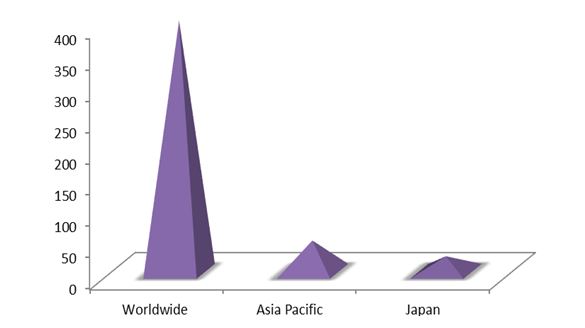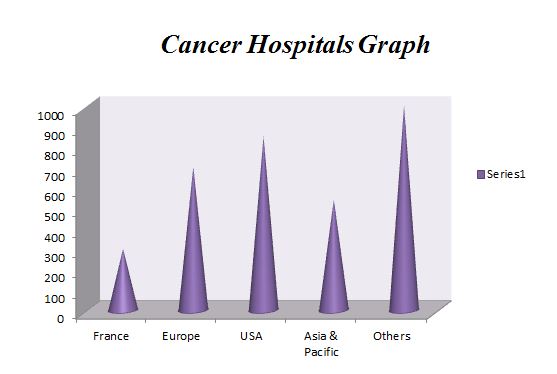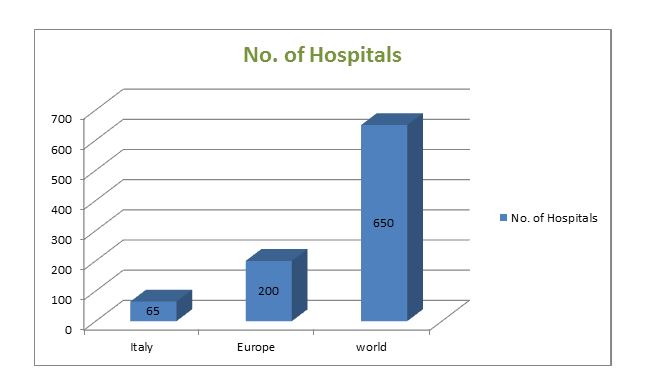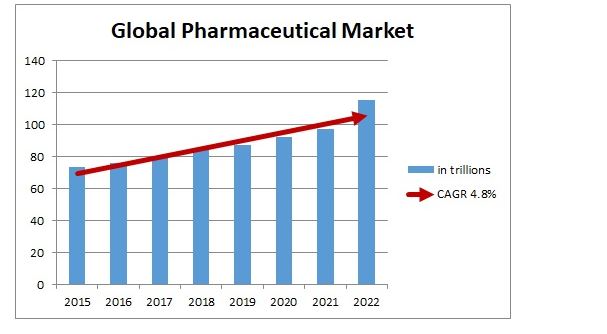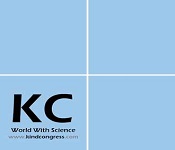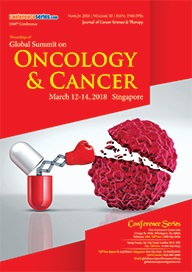Theme: Innovative approaches and research in Cancer
Global Cancer 2020
Global Cancer 2019 welcomes everyone all over the world to participate in the " 4th Global Summit on Cancer” during November 11-12, 2020 Tokyo, Japan.
Global Cancer coordinates towards tending to main issues as well as future strategies of Cancer. This will be the biggest and most encouraging universal gathering where the program incorporates Clinical Oncologists, Registered Nurses, Nurse specialists and the whole restorative group required in patient care, scientists, proficient, early profession people who wish to learn standards of tumor immunology and immunotherapy well as leaders will come to examine on different parts of challenges, risks and investment opportunities of Cancers. Global Cancer at Singapore will manage Cancer Prevention, Diagnosis, and Treatment of illnesses of the Organ-related Cancers and its inventive strategies. Global Cancer will also provide the three days of discussions on techniques and systems identified with administration and quality change of Cancer and in addition to investigate the new thoughts and ideas on worldwide scale and the themes incorporate lung malignancy, bosom disease, bone tumor, leukemia, blood cancer, cervical tumor, colon-rectum disease, pediatric malignancy, surgical tumor, Prostate growth, thyroid malignancy.
This year around 564,800 Americans are expected to die of cancer more than 1,500 individuals a day Disease is the second driving reason for death in the US. One of each four passing’s in the US is from growth. Since 1990, there have been around 5 million malignancy deaths. Lung Cancer, Blood Cancer, Breast Cancer are most common Cancers in Singapore.
As per 2012 insights around 14.1 million cases are passed on and 8.2 million deaths are accounted for. Lung, Liver, Stomach and bowel malignancies cause the most widely recognized deaths among the worldwide that records almost 50% of all the cancer deaths. Around 70% increments in the cases are not out of the ordinary throughout the following 2 decades. In males 5 most regular sites of malignancy are recognized in 2012 were lung, prostate, colorectal and liver diseases. In females 5 most shared locales analyzed were bosom, lung and stomach tumor.
ConferenceSeries llc LTD which contains 3000+ Global Events with more than 600+ Conferences, 1200+ Symposiums and 1200+Workshops on assorted Medical, Pharmaceutical, Clinical, Engineering, Science, Technology, Business and Management field is arranging meetings everywhere throughout the globe. ConferenceSeries LLC has various Cancer Gatherings, Cancer meeting, worldwide growth gathering, European Oncology Conferences, Surgical oncology like skin tumor gathering, bosom malignancy meeting, liver malignancy gathering, Lung Cancer gatherings, and Oncology Conferences where learning exchange happens through civil arguments, round table discourses, notice introductions, workshops, symposia and presentations and which gets potential outcomes for treating the maladies with new time, innovation and research.
Why to attend?
With people from around the world focused on getting some answers concerning Oncology and Cancer; this is your most obvious opportunity to accomplish the greatest cluster of individuals from the Cancer people group, Oncology Society, European Oncology Conferences. Coordinate presentations, disperse information, meet with present and potential specialists, make a sprinkle with new pharmaceutical progressions, and get name affirmation at this three day event. Broadly acclaimed speakers, the most recent systems, changes, and the most a la mode invigorates in Oncology are indications of this meeting.
Target Audience:
· Oncologists
· Radiologists
· Pathologists
· Students
· Oncology Associations & Societies
· Business Entrepreneurs
· Hematologists
· Academicians
· Research Scholars
· Software Developing Companies
· Medical Devices Companies
· Biomedical Companies
· Biotechnology Companies
· Data Management Companies
ConferenceSeries welcomes every one throughout the world to ‘4th Global Summit on Cancer Scheduled on November 11-12, 2020, Tokyo, Japan which incorporates keynote talks, Oral, Poster presentations and Exhibitions.
Global Cancer is a stage to find out the Cause of the tumor, its Prevention, Diagnosis, and Treatment of the Organ-related Cancers and its inventive strategies. This Global Cancer Conference will have three days of dialogs on techniques and procedures which will be administered in Cancer and in addition to explore the frontiers and ideas on worldwide scale and the points include lung cancer, breast cancer, bone cancer, blood cancer, cervical cancer, colon-rectum cancer, prostate cancer, thyroid cancer.
Track 1: Organ-Defined Cancers
Growth can happen anyplace in the body. The most well-known locales of malignancy among men incorporate lung, prostate, colon, rectum, stomach and liver. Also, those for among ladies are bosom, colon, rectum, lung, cervix and Stomach Cancers . Malignancies are frequently portrayed by the body part that they started in. Notwithstanding, some of the body parts contain various kinds of tissues, diseases can also be arranged by the sort of cell that the tumor cells started from. The kind of malignancy a man should have been referred to legitimately as various sorts of tumor can carry on diversely and react to various medicines.
Below are the major Types of Cancer:
Breast Cancer, Throat cancer ,Gynaecologic Cancers,Cervical Cancer,Uterus Cancer,endometrial Cancer, Ovarian Cancer, Vulvar Cancer, Oral Cancer, Brain Cancer, Bone Cancer, Prostate Cancer, Lung Cancer, Lymphoma, Leukemia, Liver Cancer, Blood Cancer, Prostate cancer, Eye Cancer, Mouth Cancer, Throat Cancer ,Skin Cancer,esophageal cancer etc.
Different types of Cancer treatment:
Track 2: Types of Oncology
Oncology is a branch of medication that arrangements with the aversion, finding, and treatment of growth. Distinctive tumors influencing diverse parts of the body e.g. blood cancer, prostate, lungs, platelets (leukemia) or different organs carry on in various way are of various evaluations and cell write, react constantly to treatment and have diverse arrangement of compelling treatment regimen. An oncologist is a specialist who treats disease. Inside oncology there are a few sub-claims to fame that arrangement with various kinds of disease and blood growth composes or blood cancer types.
- Bladder Cancer:Bladder cancer is one of the most common cancers, affecting approximately 68,000 adults in the United States each year. Bladder cancer occurs in men more frequently than it does in women and usually affects older adults, though it can happen at any age.
- Breast Cancer: Breast cancer is cancer that develops from breast tissue. Signs of breast cancer may include a lump in the breast, a change in breast shape, dimpling of the skin, and fluid coming from the nipple, a newly inverted nipple, or a red or scaly patch of skin.
- Colorectal Cancer: Colorectal cancer, also known as bowel cancer, colon cancer, or rectal cancer, is any cancer that affects the colon and the rectum.
- ​ Kidney cancer : it is also called renal cancer - is a disease in which kidney cells become malignant (cancerous) and grows out of control, forming a tumor. Almost all kidney cancers first appear in the lining of tiny tubes (tubules) in the kidney. This type of kidney cancer is called renal cell carcinoma
- Lung cancer: also known as lung carcinoma is a malignant lung tumor characterized by uncontrolled cell growth in tissues of the lung. This growth can spread beyond the lung by the process of metastasis into nearby tissue or other parts of the body.
- Lymphoma: is a group of blood cancers that develop from lymphocytes (a type of white blood cell) the name often refers to just the cancerous versions rather than all such tumors.
- Pancreatic Cancer treatment
Cancer Staging
Staging is the process of judgment out how much cancer is in a person’s body and where it’s positioned. It’s how the doctor determines the stage of a person’s cancer. For most types of cancer, doctors use staging info to help plan treatment and to predict a person’s outlook. Although each person’s situation is dissimilar, cancers with the same stage tend to have similar outlooks and are often treated the same way. The cancer phase is also a way for doctors to describe the extent of the cancer when they talk with each other about a person’s cancer.
They are different types of Staging like Clinical Staging, Pathologic Staging and Post Therapy Staging determines how abundant cancer remains after a patient is first treated with systemic and radiation treatment prior to their surgery or where no operation is performed. This can be evaluated by clinical staging guidelines and pathologic staging guidelines.
Track 3: Radiation Oncology
Radiation Oncology encompasses all aspects of research that impacts on the treatment of cancer using radiation. Radiation can be given as a curative modality, either alone or in combination with surgery and/or chemotherapy. It may also be used palliative, to relieve symptoms in patients with incurable cancers. The Radiotherapy/radiation therapy is broadly segmented into Teleradiotherapy, Brachy-radiotherapy and Metabolic Radiotherapy. Nuclear medicine is a branch of medicine that uses radiation to provide information about the functioning of a person's specific organs or to treat disease. Medical imaging is the technique and process of creating visual representations of the interior of a body for clinical analysis and medical intervention, as well as visual representation of the function of some organs or tissues.
TYPES OF RADIATION THERAPY
- 3D conformal radiation therapy
- Intensity-modulated radiation therapy (IMRT)
- Volumetric modulated radiation therapy (VMAT)
- Image-guided radiation therapy (IGRT)
- Stereotactic radiosurgery (SRS)
- Brachytherapy
- Superficial x-ray radiation therapy (SXRT)
- Intraoperative radiation therapy (IORT)
Track 4: Surgical Oncology
Medical procedure is utilized to analyze stage and treat growth, and certain malignancy related side effects. It is the branch of medical procedure connected to oncology; it centers around the administration of tumors, particularly carcinogenic tumors. Surgical oncology is a particular region of oncology that draws in specialists in the cure and administration of tumor. Regardless of whether a patient is a possibility for medical procedure relies upon variables, for example, the sort, estimate, area, review and phase of the tumor, and in addition general well being components, for example, age, physical wellness and other therapeutic commodities. For some patients, medical procedure will be joined with other growth medications, for example, chemotherapy, radiation treatment or hormone treatment.
Track 5: Cancer And Stem Cell Therapy
Stem-cell therapy is the use of stem cells to treat or prevent a disease or condition. Stem Cells and Tumors cancer cells also have the characteristic which is also associated with normal stems cells. Stem Cell Therapy is using to prevent the disease. Stems cells transplant is used to treatment of cancer like leukemia, multiple Myeloma & lymphoma. Cord Blood Stem and Cancer cord blood contains hematopoietic (blood) stem cell. They have long been used in stem cell treatments for leukemia, blood and bone marrow disorders when chemotherapy is used.
• Cancer Stem Cells
• Stem Cells and Tumors
• Stem Cell Transplantation
• Bone Marrow Transplantation
• Cord Blood Stem Cells and Cancer
• Stem Cell Research
- There are 2 main types of transplants. They are named based on who gives the stem cells.
- Autologous: The stem cells come from the same person who will get the transplant.
- Allogeneic: The stem cells come from a matched related or unrelated donor.
Autologous stem cell transplants
In this type of transplant, your own stem cells are removed, or harvested, from your blood before you get treatment that destroys them. Your stem cells are removed from either your bone marrow or your blood, and then frozen. (You can learn more about this process at what’s It Like to Donate Stem Cells?) After you get high doses of chemo and/or radiation, the stem cells are thawed and given back to you.
Allogeneic stem cell transplants
Allogeneic stem cell transplants use cells from a donor. In the most common type of allogeneic transplant, the stem cells come from a donor whose tissue type closely matches the patient’s. (This is discussed later in “Matching patients and donors.”) The best donor is a close family member, usually a brother or sister. If you don’t have a good match in your family, a donor might be found in the general public through a national registry. This is sometimes called a MUD (matched unrelated donor) transplant. Transplants with a MUD are usually riskier than those with a relative who is a good match.
Track 6: Cancer Biomarkers
A disease biomarker refers to a substance or process that is characteristic of the nearness of malignancy in the body. A biomarker might be a particle emitted by a tumor or a particular reaction of the body to the nearness of malignancy. Hereditary, epigenetic, proteomic, glycemic, and imaging biomarkers can be utilized for disease determination, guess, and the study of disease transmission. While some malignancy biomarkers can be utilized to foresee how forcefully your tumor will develop, and are in this way valuable for surveying your visualization, the most encouraging utilization of biomarkers today is to recognize which treatments a patient's growth could conceivably react to.
• Imaging Biomarkers
• Clinical Biomarkers
• Genetic Biomarkers
• Predictive Cancer Biomarkers
• Molecular Biomarkers
• Cell Free Biomarkers
Track 7: Precision Cancer Medicine & Oncology
Accuracy prescription is the fitting of restorative treatment to the individual qualities of every patient and his or her infection. Besides, through the accuracy prescription approach, the treatment of every patient can be centered around drugs well on the way to profit him or her, saving the patient the cost and potential unsafe symptoms from drugs that are probably not going to be advantageous. Oncology has been driving accuracy pharmaceutical endeavors to a great extent on account of our colossal learning of the part of hereditary transformations in the advancement and movement of growth. Exactness prescription empowers to approach discovery, determination and treatment in an inside and out approach to decide how a malignancy creates, develops and spreads.
Track 8: Cancer Treatments and Therapy
Cancer can be treated with by various procedures. The decision of treatment relies on the area and grade of the tumor and the phase of the sickness, and additionally the general condition of the patient). Numerous test malignancy medications are likewise being worked on. A few people with tumor will have just a single treatment. Be that as it may, the vast majority have a blend of medications, for example, medical procedure with chemotherapy as well as radiation treatment. You may likewise have immunotherapy or directed treatment.
Chemotherapy is a type of cancer treatment that uses drugs to kill cancer cells. Learn how chemotherapy works against cancer, why it causes side effects, and how it is used with other cancer treatments or Cancer Chemothreapy treatments.
Hormone Therapy
Hormone therapy is a treatment that slows or stops the growth of breast and prostate cancers that use hormones to grow. Learn about the types of hormone therapy and side effects that may happen.
Precision Medicine
Precision medicine helps doctors select treatments that are most likely to help patients based on a genetic understanding of their disease. Learn about the role precision medicine plays in cancer treatment, including how genetic changes in a person's cancer are identified and used to select treatments.
Track 9: Pharmacology Cancer
Growth pharmacology assumes a key part in sedate advancement. In both the lab and the facility,cancer pharmacology has needed to adjust to the changing face of medication improvement by building up exploratory models and target orientated methodologies. It additionally centers around creating trial ways to deal with the clinical treatment of growth through research that scaffolds the fields of atomic carcinogenesis, biochemical pharmacology, radiation science, and clinical pharmacology. It for the most part includes the pharmacological and oncological parts of medications at both.
Track 10: Vaccines involvement in Cancer
Growth immunizations may be large or either treats existing malignancy or counteracts improvement of a disease. In tumor treatment antibodies are comprised of cancer cells, parts of cells, or unadulterated antigens. Now and then a patient's own resistant cells are evacuated and presented to these substances in the lab to make the antibodies.
Track 11: Cancer Immunology And Immunotherapy
Cancer immunology is a branch of immunology that studies interactions between the immune system and cancer cells (also called tumors or malignancies). It is a field of research that aims to discover cancer immunotherapies to treat and retard progression of the disease. Cancer immunotherapy also known as Immune-oncology is the use of the immune system to treat cancer. Immunotherapies can be categorized as active, passive or hybrid (active and passive). The immune response, including the recognition of cancer-specific antigens, forms the basis of targeted therapy (such as vaccines and antibody therapies) and tumor marker-based diagnostic tests.
American cancer society | Apoptosisradiation
Track 12: Oncology Nursing and Care
Oncology Nursing is a field including practice envelops the parts of direct caregiver, educator, consultant ,administrator , and analyst. Oncology and tumor nursing reaches out to all care conveyance settings where customers encountering or in danger for creating growth get social insurance, training, and advising for cancer counteractive action, screening and location. It additionally includes proper screenings and other protection hones, manifestation administration, care to hold however much typical working as could be expected, and steady endless supply of life.
Track 13: Complementary & Alternative Methods\Herbal and Cancer
Elective disease medicines may not assume an immediate part in curing your cancer, however they may enable you to adapt to signs and indications caused by growth and tumor medications. CAM is the term for medicinal items and practices that are not some portion of standard care. Coordinating the best of proof based reciprocal and elective tumor medicines with the medications you get from your specialist may help soothe huge numbers of the manifestations related with growth and its treatment.
Track 14: Cancer Awareness and Survival
Expanded growth mindfulness enhances survival. Social and Economic Impact likewise hurt the nature of cancer mind. Individuals who don't get great treatment. Growth manifestation mindfulness and malignancy survival are related. Malignancy Awareness Program is led by government and numerous associations to acquire the mindfulness the general population to diminish the disease levels and towards all oncology programs. Crusades should center around enhancing mindfulness about tumor side effects, particularly in financially denied regions.
Melanoma | Epithelial cells | Squamous cells
Track 15: Cancer: Day to day Lifestyle and Nutrition
Numerous elements impact the improvement of disease. In the course of the most recent 25 years, science has demonstrated that eating routine, physical movement, and body weight—particularly being overweight or large—are significant hazard factors for building up specific sorts of disease. Around 33% of the most well-known tumors could be forestalled through way of life changes. The primary social and natural hazard factors for disease mortality on the planet are identified with abstain from food and physical latency, utilization of addictive substances, sexual and conceptive wellbeing and presentation to air contamination and utilization of debased needles. The body's capacity to oppose malignancy might be helped by following a sound eating routine, remaining physically dynamic, and maintaining a strategic distance from abundance muscle to fat ratio. Disease and tumor medicines can likewise influence your body's capacity to endure certain sustenances and utilize supplements.
Cancer information | Metastasis
On the off chance that one is battling from cancer, isn't extraordinary to encounter mental pain. Regardless of whether it is adapting to the analysis, the difficulties of treatment, or proceeded with stress over a repeat, feelings expedited by the disease experience can be hard to deal with. Growth's belongings are much more than physical. Numerous survivors find that disease's effect overflow into the enthusiastic, mental and profound domains. This may happen either immediately or directly after treatment and not for quite a long time.
Track 17: Cancer and Pharmaceutics
The discovery of new cancer drugs happens in a variety of ways like an Accidental discovery in case of the Nitrogen mustard, depends upon the Testing plants, fungi, and animals and reviewing the biology of malignant cells. Maximum scientists who are generating cancer drugs twitch by equating the genetics originated in DNA and cellular processes of cancer cells to healthy cells. These identify imperative phases in the cancer growth procedure that a drug could possibly fix. Once drugs are formed, scientists test them on humanoid tumor cells in the lab to see as they halt the growth of cancer cells. Next, they test the drug in animals to check it is still effective at treating cancer. Researchers test the drug in two or more animal species. Testing in animals helps academics learn how the body uses the new drug. Also, it shows what side effects the drug may cause and what dose of the drug to use in human research trials.
Track 18: Metabolites in Cancer
Oncogenomics is a sub field of genomics that portrays disease related qualities. It centers around genomic, epigenomic and transcript adjustments in growth. Malignancy is a hereditary malady caused by assemblage of DNA changes and epigenetic adjustments prompting uncontrolled cell multiplication and neoplasm advancement. The objective of oncogenomics is to recognize new oncogenes or tumor silencer qualities that may give new dreams into disease conclusion, expecting clinical aftereffect of developments and new focuses for malignancy treatments.
Track 19: Oncological Gynecology
Oncology Gynecology is the investigation about any disease that starts in a lady's regenerative organs. The five Gynecology tumors begin in the lady's pelvis at better places. Every tumor is extraordinary by its manifestations, signs, chance variables and in their systems of anticipation. All these five distinct kinds of Gynecology Cancers hazard increments with the age. At the point when these malignancies were analyzed at their beginning times, the treatment will be more proficient. The five noteworthy sorts of tumor influence a lady's regenerative organs are ovarian, uterine, cervical, vulvar, and vaginal disease. All these as a gathering are known as Gynecology malignancies.
SCIENTIFIC SOCIETIES • American Society for Clinical Oncology (ASCO) • American Association for Cancer Research (AACR) • European Society for Medical Oncology (ESMO) • Société Française du Cancer (SFC), French Cancer Society • Association pour la Recherche Thérapeutique Anti-Cancéreuse (ARTAC), Association for Research and Treatments Against Cancer • New York Academy of Sciences • Association Française pour l'Avancement des Sciences (AFAS), French Association for the Advancement of Science.
Recommended Conferences:
36th World Cancer Conference Octomber 11- 13, 2018 : 5th Global summit on Cancer Threapy , International Conference on Frontiers in Gynecological Cancers, November 07-08,2018, Singapore : 16th Asia Pacific Oncologists Annual Meeting , May 13-14 , 2018, Singapore : 28th International conference on Cancer Research and anticancer therapies, September 17,18 , 2018, California, USA : ASCO Anuual Meeting, June 1-5, 2018, Chicago, Illinois: ECCO 2018 European Cancer Summit, Sep 07-09,2018,Vienna, Austria : 4th Edition of World Congress On Cancer Research Survivorship and Mangement, October 08-09, 2018, Russia : 13th World Cancer Congress, Feb 26-27th 2019, Paris, France : 28th Euro Global Summit on Cancer Threapy and Radition Oncology, July 23-25, Rome, Italy : 11th European Breast Cancer Conference , ASCO Post, Cancer Research and Threapy 2018, 6-7, Sep, Italy.
Related Cancer Conferences | Oncology Conferences | Cancer Science Conferences
Cancer is the name given to a collection of related diseases. In all types of cancer, some of the body’s cells begin to divide without stopping and spread into surrounding tissues. Cancer can start almost anywhere in the human body, which is made up of trillions of cells. Normally, human cells grow and divide to form new cells as the body needs them. When cells grow old or become damaged, they die, and new cells take their place. When cancer develops, however, this orderly process breaks down. As cells become more and more abnormal, old or damaged cells survive when they should die, and new cells form when they are not needed. These extra cells can divide without stopping and may form growths called tumors.
Importance and Scope
2019 Global Cancer will be the best platform for all the scientist, radiologists, oncologists, research scholars, students who are working in this field to exchange their knowledge related to Cancer and oncology. This international event is an effort to find an alternative for invasive imaging technique against cancer like Liver Cancer, Breast Cancer, Lung Cancer, Kidney Cancer, Cancer in adults & cancer in children.
North America is the leading regional marketplace for cancer diagnostics with a part of approximately 40.7% of the general cancer diagnostics market in terms of income in 2015, shadowed by Europe which accounted for around 29.1% share in the market.
Why Tokyo??
Global Summit on Oncology & Cancer is going to be held in Tokyo, Japan. Tokyo is often referred to as a city, but is officially known and governed as a "metropolitan prefecture", which differs from and combines elements of a city and a prefecture, a characteristic unique to Tokyo. The Tokyo Metropolitan Government administers the 23 Special Wards of Tokyo (each governed as an individual city), which cover the area that was the city of Tokyo. Tokyo has numerous outlying islands, which extend as far as 1,850 km (1,150 mi) from central Tokyo. Because of the islands' distance from the administrative headquarters of the Tokyo Metropolitan Government in Shinjuku, local sub prefectural branch offices administer them.
Major Medical Universities
Worldwide
- Emory University
- Karolinska University
- University of Cambridge
- University of Oxford Stanford University
- UNC School of Medicine
- Harvard University
- Mayo Medical School
- Yale University
- University of Minnesota
- John Hopkins University
- Pittsburgh School of Medicine
- University of Wisconsin
- Kings College London
- Feinberg School of Medicine
In Asia Pacific
- The University of Tokyo
- University of Delhi
- KAIST - Korea Advanced Institute of Science and Technology
- National University of Singapore (NUS)
- Kyoto University
- University of Hong Kong (HKU)
- Peking University
- Seoul National University (SNU)
- National Taiwan University (NTU)
- Osaka University
- Tsinghua University0
- The Chinese University of Hong Kong (CUHK)
- Fudan University
- The Hong Kong University of Science and Technology (HKUST)
- Shanghai Jiao Tong University
- Mahidol University
- Korea University
- Beijing University of Chinese Medicine
- Taipei Medical University
- Beijing Institute of Technology
- Yonsei University
- Nanyang Technological University (NTU)
- Chulalongkorn University
- Tohoku University
- Tokyo Medical and Dental University
- Kyushu University
- Nagoya University
- Hokkaido University
- Sungkyunkwan University
- University of Science and Technology of China
- Pohang University of Science and Technology (POSTECH)
- Universiti Malaya (UM)
- Zhejiang University
- Keio University
- Indian Institute of Science
- Tokyo Institute of Technology
- Universiti Kebangsaan Malaysia (UKM)
- Universiti Sains Malaysia (USM)
- Nanjing University
- Kyung Hee University
- National Yang Ming University
- University of Indonesia
- University of the Philippines
- University of Tsukuba
- Bandung Institute of Technology (ITB)
- Hanyang University
- Indian Institute of Technology Bombay (IITB)
- National Cheng Kung University
- Universiti Putra Malaysia (UPM)
Major Cancer Associations:
Worldwide
- American Association for Cancer Research
- Virginia Cancer Institute
- American Brain Tumor Association
- American Society of Pediatric Hematology/Oncology
- Association of Cancer Physicians
- American Childhood Cancer Organization
- American Society of Clinical Oncology
- Australasian Lung Cancer Trials Group
- International Cancer Research Partnership (ICRP)
- American Association for Cancer Research (AACR)
- American Society of Clinical Oncology (ASCO)
- International Agency for Research on Cancer (IARC)
- Cancer Society of New Zealand
- Irish Cancer Society
- Australian Cervical Cancer Foundation
- Medical Centre Cologne
- Cancer Research UK
- Australian Prostate Cancer Research
- Peter McCollum Cancer Centre
- The European Cancer Organization (ECCO)
- German Cancer Research Centre
In Asia Pacific
- Medical Excellence JAPAN
- Japan Community Health care Organization Chukyo Hospital
- Aichi Cancer Center Hospital
- Japanese Red Cross Nagoya Daiichi Hospital
- Kyoto University Hospital
- Dokkyo Medical University Hospital
- Japan Hospital Association
- Aizawa Hospital
- Medical Excellence JAPAN
- Japan Community Health care Organization Chukyo Hospital
- Aichi Cancer Center Hospital
- Japanese Red Cross Nagoya Daiichi Hospital
- Kyoto University Hospital
- Dokkyo Medical University Hospital
- Japan Hospital Association
- Aizawa Hospital
- University Hospital Kumamoto University
- International Medical Center of Japan
- The Asia-Pacific Urogynecology Association
- The Asia-Pacific Cancer Society Training
- Asian Cancer Foundation India
- The Max Foundation
- Childhood Cancer International Netherlands
- The Asia Pacific Prostate Society
Market Analysis Report
The global cancer diagnostics market is expected to grow at a CAGR of 11.8% during the forecast period 2017-2023. There are several methods of diagnosing cancer today such as biopsy based, endoscopy based, imaging procedure, tumor cancer diagnostics and many more. Population affected with cancer is showing a tremendous growth during last few years, which create the requirement of advanced technology for diagnosis cancer on early stage. According to the American Cancer Society, in 2017, it is estimate that around 161,360 new cases of prostate cancer will be diagnosed and around 26,730 deaths occur owing to prostate cancer in the United States. Thus, many companies are involved in collaboration in order to provide better technology for diagnosis the cancer. In this regards, in January, 2015, Roche and Qualcomm Incorporated entered into a strategic collaboration to improve remote monitoring and management of patients with chronic disease.
Major Cancer- Pharma Companies:
The total cost of cancer therapeutics and medicines used in supportive care– measured at the ex-manufacturer price level before the application of rebates or other price concessions – reached $107 billion in 2015, representing an increase in constant dollars of 11.5% over the prior year.
Annual global growth in the oncology drug market is expected to be 7.5 – 10.5 % through 2020, reaching $150 billion. Wider utilization of new products—especially immunotherapies—will drive much of the growth, offset by reduced use of some existing treatments with inferior clinical outcomes.
about $51.2 billion in 2017 and is expected to reach $66.4 billion in 2019, registering a compound annual growth rate (CAGR) of 5.4% for the period 2014-2019. It includes current issues and trends affecting the industry, costs and factors influencing demand. The report covers biological products in development, biological products in clinical trials, and currently marketed and late-stage development biologic cancer products.
Abstract deadlines: December 30, 2019
First Earlybird date: December 30, 2019
Registration deadline: December 30, 2019
Conference Highlights
- Organ-Defined Cancers
- Types of Oncology
- Radiation Oncology
- Surgical Oncology
- Cancer & Stem Cell Therapy
- Cancer Biomarkers
- Cancer Treatments and Therapy
- Pharmacology Cancer
- Vaccines involvement in Cancer
- Cancer Immunology And Immunotherapy
- Oncology Nursing and Care
- Complementary & Alternative Methods Herbal and Cancer
- Cancer Awareness and Survival
- Cancer: Day to day Lifestyle and Nutrition
- Cancer: Social Aspects of Psychology
- Cancer and Pharmaceutics
- Metabolites in Cancer
- Oncological Gynecology
To share your views and research, please click here to register for the Conference.
To Collaborate Scientific Professionals around the World
| Conference Date | November 11-12, 2020 | ||
| Sponsors & Exhibitors |
|
||
| Speaker Opportunity Closed | |||
| Poster Opportunity Closed | Click Here to View | ||
Useful Links
Special Issues
All accepted abstracts will be published in respective Our International Journals.
Abstracts will be provided with Digital Object Identifier by




